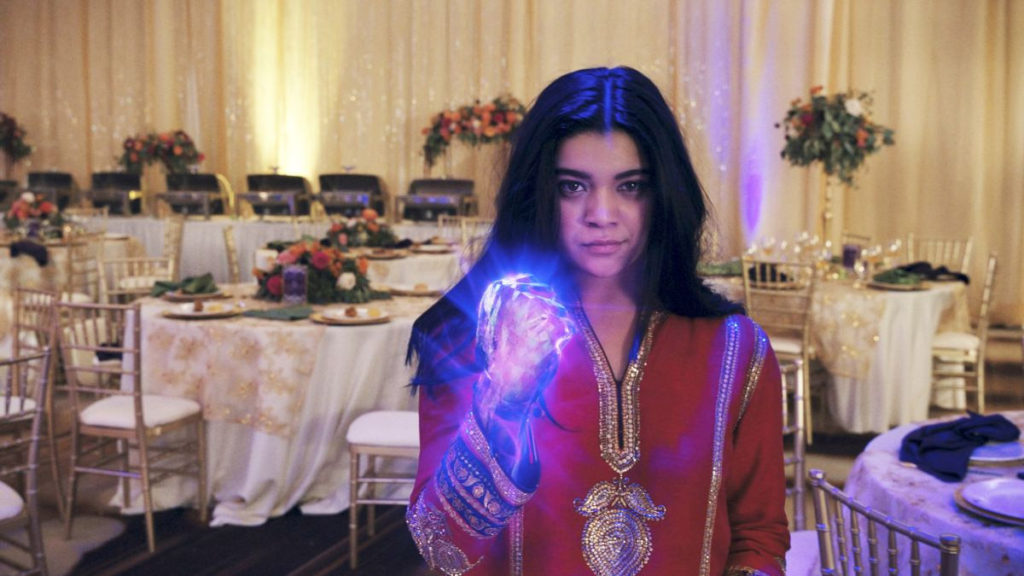Ms. Marvel was always going to be a dicey play for Marvel, as it’s centered around the first Muslim superhero in the MCU. There’s no surprise that the show has ruffled the feathers of both racists- sorry, ant-SJWS and anti-woke people- and also some staunch Muslims. However, flawed though the show may be, it is carried by a perfectly-cast lead actress who wins people over with her infectious charm, and the care this show takes in treating the South-East Asian culture that Kamala Khan and her family belong to.
Kamala Khan (Iman Vellani) is a Pakistani-American teenager from New Jersey who’s determined to win the cosplay contest at the upcoming Avengercon. Once she dons a bangle that her maternal grandmother (or Nani) sent her, she discovers new light-based superpowers that turn her world upside down. Aided by her BFF Bruno (Matt Lintz), she tries to figure out the source of her power, soon running into a group of beings from another dimension who call themselves the Clandestines. They want to use the bangle to return to their home dimension, even though it might destroy Earth in the process. Thus begins a cat-and-mouse game between Kamala and the Clandestines, as she travels to Pakistan to learn about her family’s secret past, as well as her powers.

The best thing about Ms. Marvel is undoubtedly Iman Vellani, who perfectly embodies the spirit and character of Kamala Khan.
A die-hard MCU and comics fan- who even frequents the r/marvelstudiosspoilers subreddit- she turns in a performance that makes it hard to believe this was actually her first onscreen role. The extended cast also turns in great performances, in particular, Zenobia Shroff and Mohan Kapur as Kamala’s parents, Muneeba and Yusuf. Although Muneeba gets the most screentime, Mohan Kapur also turns in a nuanced portrayal where he’s not simply the good cop to Muneeba’s bad cop. In fact, even Muneeba works past her worries for Kamala and ends up supporting her in her choice to be a superhero.
Matt Lintz is great as the lovestruck Bruno, and the frenemy dynamic he has with Kamran (Rish Shah), another of Kamala’s love interests, is hilarious, with Kamran constantly calling him Bryan. Even Yasmeen Fletcher, who plays Kamala’s friend, Nakia, gets to make a solid impression, despite her not as much screentime during the middle portion of the show.
As good as the acting is, what I most loved about Ms. Marvel is just how much care the creators took in creating a show that touched on the protagonist’s culture and roots in an authentic manner.
We see Kamala and Nakia jostling for the one working water tap in a mosque while performing ablutions (wudu) before prayer, and then Nakia campaigning for a seat on the mosque’s board during Eid. We get to see the joyous dance numbers that are almost a mandatory part of South-East Asian weddings at this point, and even a close look into inter-generational trauma between Sana (Kamala’s Nani) and Muneeba. The show tops off its exploration of Kamala’s roots with a brief but emotionally resonant flashback that shows Aisha (Mehwish Hayat), Kamala’s great-grandmother, finding and falling in love with Hasan (Fawad Khan), and then tragically losing her family while traveling to the newly-created Pakistan during Partition.
The soundtrack is full of catchy, modern Indian and Pakistani songs, including two songs from the current season of Coke Studio Pakistan, which serve as a great gateway for both lapsed fans of South-East Asian music as well as newcomers. Lastly, Ms. Marvel uses exaggerated animated effects to call attention to certain characters and creatively-realized text messages.
As good as the show is, it has its fair share of flaws.
The story isn’t structured as efficiently as it could have been, setting up Kamala’s friends and high school environment in the first three episodes before whisking her away to Pakistan for two episodes, introducing a completely new environment as well as new characters. Furthermore, the finale’s Home-Alone-meets-superpower climax feels a tad too ridiculous that makes federal agents- ones armed with dangerous sonic weapons no less- appear especially incompetent. The villains, the Clandestines, attack Kamala too soon, and then they somehow keep finding her, be it in New Jersey or Pakistan. Although they get captured, their escape from the Department of Damage Control agents is poorly executed, and their resolution in episode 5 isn’t pulled off well.
The common criticism that’s been heard from Muslims in the subcontinent is that the show tried to pander to Muslims but made a mockery of the religion and the culture. I get the urge to reject a show that’s highly Westernized, but it does more good than harm to the representation of Muslims in pop culture, especially considering that the dominant portrayal of Muslims so far has been Apu from Simpsons and terrorists.
Ms. Marvel is nonetheless a watershed moment for pop culture, in that it shows that there’s a place for minorities to play a leading role in something as large and global as the Marvel Cinematic Universe.
Although the first superhero was conceived by two Jewish writers, for a long time the heroes were mostly white men until pioneers began to introduce people of color donning those same tights from the seventies onward.
Ms. Marvel, hopefully, is an indication for the pioneering stories to come, that recognize and empower other minorities who still haven’t had their turn with proper representation.